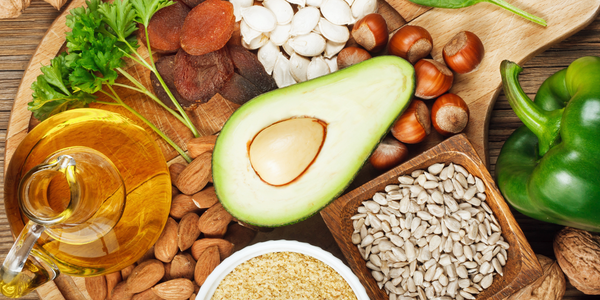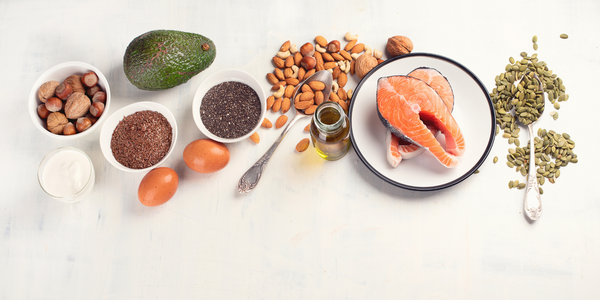
The Wavelength
Top Five Nutrients For Glowing Skin, According To A Dietitian
Skin Health Comes from Within
Considering that the skin is the largest organ in the body, it's never too early to start taking care of it. There are countless facial lotions, serums, and oils on the market these days, but it's unclear how effective they are. As a registered dietitian who has worked with many individuals with varying skin concerns, I have found one thing to be certain. Real change comes from within.
What you eat and drink can have a significant impact on your skin health. In fact, there are several nutrients that support your skin at a cellular level and play a role in keeping a glowing complexion. Keep on reading to learn about the best nutrients for clear skin!
Five Nutrients for a Glowing Complexion
Vitamin C

Vitamin C is well-known for its role in supporting the immune system and helping the body prevent infections. But did you know Vitamin C is one of the most important vitamins for skin health? That's because it stimulates collagen production, a protein responsible for providing structure, strength, and firmness to the skin. Due to being a powerful antioxidant, vitamin C also plays a role in repairing skin damage. It does so by neutralizing free radicals – unstable molecules that can cause damage to cells and tissues in the body, including skin cells. Vitamin C is abundant in many fruits and vegetables:
- Fruits such as kiwi, papaya, strawberries
- Citrus fruits such as oranges, lime, and lemon
- Colorful vegetables such as bell peppers and sweet potatoes
- Cruciferous vegetables such as broccoli and cauliflower
- Leafy greens such as kale and spinach

Another powerful antioxidant, vitamin E, helps protect the skin from oxidative damage and may even prevent premature aging. It does so by absorbing the energy from ultraviolet (UV) light, which, in turn, reduces free radical damage to the skin. This is important because exposure to UV rays can damage the DNA in skin cells and may lead to skin cancer and premature aging. In fact, low vitamin E levels have been associated with several inflammatory skin conditions. Sources of vitamin E include:
- Nuts and seeds such as almonds, sunflower seeds, pine nuts, and hazelnuts
- Green vegetables such as collard greens, broccoli, and turnip greens
- Fruits such as avocado, mango, and kiwi
- Plant-based oils such as sunflower oil and olive oil

Zinc is a mineral that plays an important role in producing new skin cells, skin repair, and wound healing. It also supports a glowing complexion by protecting the skin against UV-induced (sun) damage. Zinc is abundant in animal protein as well as plant foods, and zinc deficiency is associated with skin inflammation, lesions, and delayed wound healing. Source of zinc inclulde:
- Oysters
- Red meat
- Poultry
- Nuts and seeds such as pumpkin seeds, cashews, and almonds
- Legumes such as lentils, beans, chickpeas, peas, and soy products such as tofu
- Whole grains such as oats, brown rice, and quinoa
Selenium, a mineral with powerful antioxidant properties, works in conjunction with vitamin C and E in reducing oxidative and sun damage to the skin. Selenium has been shown to support a healthy inflammation response, and reduce DNA damage, skin aging, and related diseases. Nuts, seafood, and shellfish are some of the richest sources of selenium:
- Brazil nuts (a single Brazil nut contains more than 100% of the RDA for selenium)
- Lean poultry such as chicken and turkey
- Sunflower seeds
- Walnuts
- Fish and shellfish, such as tuna, oysters, and shrimp
- Eggs
- Whole grains such as whole wheat pasta and brown rice
- Fortified grains

Also known as the ‘good' kind of fats, monounsaturated and polyunsaturated fats promote heart health, but did you know they are also essential for clear, resilient skin? Omega-3 fatty acids, a type of polyunsaturated fat, are especially important for skin health. There are three main types of omega-3 fatty acids: Docosahexaenoic Acid (DHA), Eicosapentaenoic Acid (EPA), and Alpha-Linolenic Acid (ALA). DHA and EPA are found mainly in animal foods and marine sources such as fatty fish, while ALA is found primarily in plant foods. EPA and DHA play crucial roles in proper fetal development and the immune system, and while ALA can be converted into EPA and DHA, the conversion rate is quite limited (less than 10%). Therefore, obtaining DHA and EPA from diet and supplementation is important.
These essential fatty acids must be obtained from food and are an integral structural component of cell membranes, which make up a large part of your skin. Omega-3 also plays a role in keeping your skin hydrated and protecting it from sun damage, which may reduce photoaging or premature aging of the skin. An omega-3 deficiency may present itself in the form of dry and irritated skin due to loss of moisture. Dietary sources of omega-3 include:
- Cold-water fatty fish and seafood
- Chia Seeds
- Flax Seeds
- Hemp Seeds
- Walnuts
A radiant glow doesn't just come from working on your skincare routine; it starts with what you put in your body. There are essential nutrients in foods that support skin health on a molecular level and should be a part of your daily routine. But let's be clear: This doesn't mean you will get through life without a few wrinkles. After all, aging is inevitable. However, you can delay the aging process by consuming wholesome foods and supplements that will give you that naturally-healthy skin look.
Supplementing your nutrition with plant-rich formulas and staying hydrated is an easy way to support your skin and entire body while preventing nutrient deficiencies. Blueshift's Skin Defense Plus promotes skin health from the inside out with a powerhouse blend of carefully curated ingredients:
- Antioxidants: Vitamins C, E, grape seed extract, and silica help reduce skin cell damage from free radicals and UV rays.
- Hyaluronic Acid: Hydrates and moisturizes skin by binding to water molecules and increasing the water content of the skin.
- VERISOL® B: Collagen peptides that are clinically proven to improve skin elasticity, and reduce wrinkles and fine lines (sign us up!)
About the Author
Carolina Schneider, MS, RD, is a registered dietitian and a writer specializing in plant-based nutrition. Carolina is the founder of Hungry for Plants, a company dedicated to offering nutrition consulting services to health and wellness brands, primarily in the plant-based food and beverage space.
